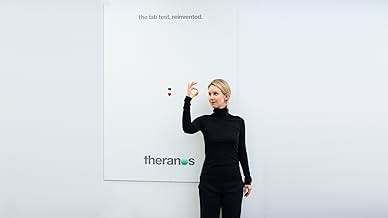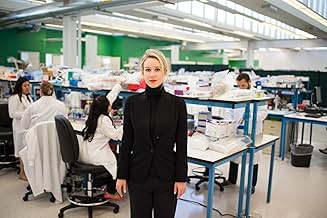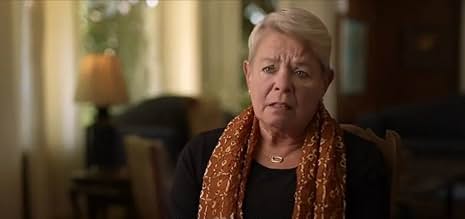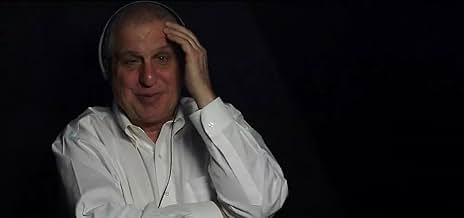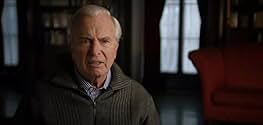NOTE IMDb
7,2/10
16 k
MA NOTE
L'histoire de Theranos, une entreprise technologique de plusieurs milliards de dollars, de sa fondatrice Elizabeth Holmes, la plus jeune femme milliardaire autoproclamée, et de la fraude mas... Tout lireL'histoire de Theranos, une entreprise technologique de plusieurs milliards de dollars, de sa fondatrice Elizabeth Holmes, la plus jeune femme milliardaire autoproclamée, et de la fraude massive qui a causé l'effondrement de l'entreprise.L'histoire de Theranos, une entreprise technologique de plusieurs milliards de dollars, de sa fondatrice Elizabeth Holmes, la plus jeune femme milliardaire autoproclamée, et de la fraude massive qui a causé l'effondrement de l'entreprise.
- Réalisation
- Scénario
- Casting principal
- Nommé pour 1 Primetime Emmy
- 2 victoires et 3 nominations au total
Elizabeth Holmes
- Self - CEO and Founder of Theranos
- (images d'archives)
Dave Philippides
- Self
- (as Dave Philippide)
Ramesh Balwani
- Self - President and Chief Operating Officer
- (as Sunny Balwani)
Avis à la une
"The Inventor: Out for Blood in Silicon Valley" (2019 release; 120 min.) is a documentary about the rise and fall of Elizabeth Holmes and her biotech company Theranos. As the movie opens, we are in 2014, at the peak of the company's might and moving into spectacular new headquarters in Palo Alto. The voice over informs us that "within 4 years, the company would go from being valued at $10 billion to less than zero. This is a cautionary tale." We then are introduced to Holmes' background, what an over-achiever she always was, and eventually leading her to drop out of Stanford at age 20, and instead use the tuition money as seed money for Theranos, which Holmes envisioned as providing low-cost access to blood testing. As the company grow, staff is enthused, female employees see Holmes as a hero, and publications like Fortune and inc. provide glowing coverage. But the company isn struggling with he manufacture of its Edison testing kit... At this point we're 15 min. into the movie, and you'll just have to see for yourself how it all plays out.
Couple of comments: this is the latest documentary from Alex Gibney, whose 2013 "The Armstrong Lie" is just one of his many outstanding films. Here he looks at Holmes and Theranos. Can the two be separated? It'd be difficult to do so, as it almost feels like Holmes built a cult of personality within Theranos. When a company grows so spectacularly and then implodes with an even greater bang, it always makes for fascinating viewing/reading/studying. Gibney seems to have gone all out in interviewing the relevant characters, including journalists and ex-employees. And then there is former Secretary George Schultz, now in his 90s, and still going strong. He introduces Holmes to his grandson, who ends up working at Theranos and see it all go wrong. Wow. The movie also benefits from the inclusion of the interview of a behavioral economist, who puts it all into context. At the beginning we are told this is a cautionary tale, and that it certainly is, but it's a lot more than just that.
"The Inventor: Out for Blood in Silicon Valley" recently premiered on HBO and I finally watched it on demand the other night. I have a soft sport for non-fiction in general, including in films and in books. As soon as I saw the name Alex Gibney associated with this, I was pretty sure that this would be worth checking out, and I was right. If you love documentaries, I'd readily suggest you check it out, be it on VOD or eventually on DVD/Blu-ray, and draw your own conclusion.
Couple of comments: this is the latest documentary from Alex Gibney, whose 2013 "The Armstrong Lie" is just one of his many outstanding films. Here he looks at Holmes and Theranos. Can the two be separated? It'd be difficult to do so, as it almost feels like Holmes built a cult of personality within Theranos. When a company grows so spectacularly and then implodes with an even greater bang, it always makes for fascinating viewing/reading/studying. Gibney seems to have gone all out in interviewing the relevant characters, including journalists and ex-employees. And then there is former Secretary George Schultz, now in his 90s, and still going strong. He introduces Holmes to his grandson, who ends up working at Theranos and see it all go wrong. Wow. The movie also benefits from the inclusion of the interview of a behavioral economist, who puts it all into context. At the beginning we are told this is a cautionary tale, and that it certainly is, but it's a lot more than just that.
"The Inventor: Out for Blood in Silicon Valley" recently premiered on HBO and I finally watched it on demand the other night. I have a soft sport for non-fiction in general, including in films and in books. As soon as I saw the name Alex Gibney associated with this, I was pretty sure that this would be worth checking out, and I was right. If you love documentaries, I'd readily suggest you check it out, be it on VOD or eventually on DVD/Blu-ray, and draw your own conclusion.
I was struck by some of the similarities between this and an ostensibly very different documentary I recently watched, about the disastrous Fyre (music) Festival. In both cases, a young person managed to get older and supposedly wiser people to give them ridiculous amounts of money based purely on their chutzpah, while providing nothing in the way of oversight or verification in return. In both cases, everyone involved should have known better from the beginning.
I don't know the history of the production of this documentary, but there's a lot of very flattering footage of Holmes, so my guess is that at the heart of this, someone was working on a hagiography about her and then re-tasked the footage when things went South. This means you'll get your fill of her strange unblinking stare and weirdly affected voice.
I found very amusing that hordes of older men were quick to fawn over her (sometimes to an embarrassing degree) and support her financially, while the only person who didn't buy it was her female professor at Stanford. Is it possible these men maybe weren't thinking with their brains? I wonder (actually I don't).
Everyone compared her to Steve Jobs, and she consciously cultivated the image, but the thing everyone forgets is the Apple didn't involve any new or even challenging technology. No one doubted you could build a home computer. Jobs' genius was realizing people would *buy* one. In contrast, Holmes was claiming to have developed a revolutionary new technology that had eluded some of the biggest medical tech companies in the world, and everyone simply took her word for it with no evidence whatsoever. Imagine if instead of a computer, Jobs had claimed to have built a spaceship in his garage, and then rounded up investors without showing it to anyone. That's more like what Theranos was like.
The movie does a very good job of laying out the facts and the time line, but a central question remains unanswered; namely, when exactly did things go from "optimism" to "fraud"? Was it a scam from the beginning, or did she really think she could pull it off? Maybe that can't be answered by anyone but Holmes, and she's not saying. Even if you're very generous with your impression of her, the "adults" should have more realistic and looked out for things.
In the end, it's a cautionary tale from which I doubt anyone will learn anything.
I don't know the history of the production of this documentary, but there's a lot of very flattering footage of Holmes, so my guess is that at the heart of this, someone was working on a hagiography about her and then re-tasked the footage when things went South. This means you'll get your fill of her strange unblinking stare and weirdly affected voice.
I found very amusing that hordes of older men were quick to fawn over her (sometimes to an embarrassing degree) and support her financially, while the only person who didn't buy it was her female professor at Stanford. Is it possible these men maybe weren't thinking with their brains? I wonder (actually I don't).
Everyone compared her to Steve Jobs, and she consciously cultivated the image, but the thing everyone forgets is the Apple didn't involve any new or even challenging technology. No one doubted you could build a home computer. Jobs' genius was realizing people would *buy* one. In contrast, Holmes was claiming to have developed a revolutionary new technology that had eluded some of the biggest medical tech companies in the world, and everyone simply took her word for it with no evidence whatsoever. Imagine if instead of a computer, Jobs had claimed to have built a spaceship in his garage, and then rounded up investors without showing it to anyone. That's more like what Theranos was like.
The movie does a very good job of laying out the facts and the time line, but a central question remains unanswered; namely, when exactly did things go from "optimism" to "fraud"? Was it a scam from the beginning, or did she really think she could pull it off? Maybe that can't be answered by anyone but Holmes, and she's not saying. Even if you're very generous with your impression of her, the "adults" should have more realistic and looked out for things.
In the end, it's a cautionary tale from which I doubt anyone will learn anything.
Like others, I followed the Theranos/Elizabeth Holmes story and in addition read the excellent book that investigative journalist John Carreyrou authored and published last year (Bad Blood).
It felt that the first part of this documentary was a hagiography rather than an incisive investigative documentary - the focus on the "female Steve Jobs" perspective dominated and she certainly seemed to have the same "reality distortion field" powers he had. However, having read the book my perspective was that she, and her boyfriend/COO Sunny Balwani were bullies (via lawyer David Boies, security guards and others) to their staff , associates and others and who benefited by manipulating otherwise smart, powerful people and taking advantage of their wishful thinking. Eventually the documentary got to the reality but it felt like a long time and frankly I found some of the interviews (eg with the respected behavioral economist Dan Ariely) to be somewhat ethereal and did not add value to the story.
I have been around start-ups and understand the notion of "faking it a bit" to get to the final "vision". However, to compare her to an Edison, a Jobs or a Musk was inappropriate. in terms of her ability to manipulate, tell brazen lies and intimidate I feel a much more appropriate comparison would have been Bernie Madoff.
It felt that the first part of this documentary was a hagiography rather than an incisive investigative documentary - the focus on the "female Steve Jobs" perspective dominated and she certainly seemed to have the same "reality distortion field" powers he had. However, having read the book my perspective was that she, and her boyfriend/COO Sunny Balwani were bullies (via lawyer David Boies, security guards and others) to their staff , associates and others and who benefited by manipulating otherwise smart, powerful people and taking advantage of their wishful thinking. Eventually the documentary got to the reality but it felt like a long time and frankly I found some of the interviews (eg with the respected behavioral economist Dan Ariely) to be somewhat ethereal and did not add value to the story.
I have been around start-ups and understand the notion of "faking it a bit" to get to the final "vision". However, to compare her to an Edison, a Jobs or a Musk was inappropriate. in terms of her ability to manipulate, tell brazen lies and intimidate I feel a much more appropriate comparison would have been Bernie Madoff.
For those who have been unable to read the book Bad Blood about Theranos, this HBO documentary can help get you up to date on how the unimaginable happened. It's also easier to understand and remember the the events and people visually.
Visually this is a pretty clear and thorough depiction of the events. Clever blending of her walking around the office. It's nice to see the whistleblowers Tyler and Erika. And on the flip side Sunny Balwani the guy who helped sell the con.
Some faults. There are a few slower moments that could have been edited out. Some of the people who gave interviews were not that interesting. A lot of laughing by the interviewees. Too many shots of her scary stare, but she did blink once!
Looking forward to the movie with Jennifer Lawrence. It's good to watch this documentary before the movie comes out because movies can be confusing and it can be tough to figure out who is who.
Visually this is a pretty clear and thorough depiction of the events. Clever blending of her walking around the office. It's nice to see the whistleblowers Tyler and Erika. And on the flip side Sunny Balwani the guy who helped sell the con.
Some faults. There are a few slower moments that could have been edited out. Some of the people who gave interviews were not that interesting. A lot of laughing by the interviewees. Too many shots of her scary stare, but she did blink once!
Looking forward to the movie with Jennifer Lawrence. It's good to watch this documentary before the movie comes out because movies can be confusing and it can be tough to figure out who is who.
I had read John Carreyrou's fine Wall Street Journal articles, as well as his thrilling book, Bad Blood, before seeing this documentary tonight. The first half of the documentary seems almost worshipful of Elizabeth Holmes, building up her mystique and putting her unique ability to attract doting followers to her message on display. Quite a lot of time is spent gazing into those big blue, unblinking eyes. By the time we get around to the cracks in the facade, we are more than an hour into the film. It is inevitable that a lot of important background was left out: the climate of constant firings that went on for years, the fact that Sunny and Elizabeth met when he was 38 (and married) and she was 19, that Elizabeth's dad had been a VP at Enron, etc. Mostly I would have appreciated a little more specific information on why the Edison machine failed. The examples given in the film don't seem that unsolvable, but I know from the book that there were some basic issues that simply couldn't be dreamed away owing to the tiny sample sizes from the finger pricks.
Tyler Shultz comes off as a happy-go-lucky guy, but in fact he is one of the heroes of this story. It is not mentioned in this film, but not just his grandfather former Secretary of State and Theranos board member George Schultz, but also his parents flipped out when he told them he was quitting the company. His bravery in standing up for his values is truly admirable in one so young, especially considering the immense pressure he came under. To his parents' credit, they came around and ended up mortgaging their home to pay his legal bills.
Ultimately, though, the story gets Elizabeth right: she is a zealot who is deaf to any naysayers, even to this day. The cautionary tale for the rest of us, is are we George Shultz or Tyler Shultz? Are we willing to see the truth and make a difficult decision, or are we too invested to be willing to give up on something we had believed in?
Le saviez-vous
- AnecdotesThe film's producer met with Elizabeth Holmes early in development, before criminal charges were filed, to determine whether she could be interviewed for the film. Ultimately the director decided he wanted to portray how Holmes carefully crafted Theranos and her own image to be seen by the public, up until the story unraveled. Accordingly, aside from brief footage from her deposition, all footage of Holmes seen in the film is from archival material from before she was charged, most of it her own commissioned promotional video for Theranos. Alex Gibney remarked "She made the documentary she wanted me to invest in and I used it to a different purpose."
- ConnexionsReferenced in Film Junk Podcast: Episode 702: Dragged Across Concrete (2019)
- Bandes originalesU Can't Touch This
Written by M.C. Hammer (as Stanley Kirk Burrell), Rick James & Alonzo Miller
Performed by M.C. Hammer
Courtesy of Capitol Records
Under license from Universal Music Enterprises
Meilleurs choix
Connectez-vous pour évaluer et suivre la liste de favoris afin de recevoir des recommandations personnalisées
- How long is The Inventor: Out for Blood in Silicon Valley?Alimenté par Alexa
Détails
- Date de sortie
- Pays d’origine
- Langue
- Aussi connu sous le nom de
- Untitled Alex Gibney/HBO Project
- Sociétés de production
- Voir plus de crédits d'entreprise sur IMDbPro
- Durée1 heure 59 minutes
- Couleur
- Mixage
- Rapport de forme
- 16:9 HD
Contribuer à cette page
Suggérer une modification ou ajouter du contenu manquant



